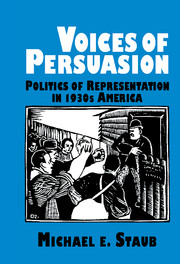Book contents
- Frontmatter
- Contents
- Acknowledgments
- Preface
- 1 Spoken Testimony, Unwritten History
- 2 John Dos Passos and James Agee: You Won't Hear It Nicely
- 3 John Neihardt, William Benson, and Ruth Underhill: Telling Native American History
- 4 Zora Neale Hurston: Talking Black, Talking Back
- 5 Tillie Olsen and the Communist Press: Giving the People Voice
- Notes
- Bibliography
- Index
- CAMBRIDGE STUDIES IN AMERICAN LITERATURE AND CULTURE
- Frontmatter
- Contents
- Acknowledgments
- Preface
- 1 Spoken Testimony, Unwritten History
- 2 John Dos Passos and James Agee: You Won't Hear It Nicely
- 3 John Neihardt, William Benson, and Ruth Underhill: Telling Native American History
- 4 Zora Neale Hurston: Talking Black, Talking Back
- 5 Tillie Olsen and the Communist Press: Giving the People Voice
- Notes
- Bibliography
- Index
- CAMBRIDGE STUDIES IN AMERICAN LITERATURE AND CULTURE
Summary
THIS BOOK is about representation and its discontents. It rewrites 1930s cultural history by analyzing Depression-era writings from a wide range of genres – documentary, ethnography, oral history, folklore, journalism, and social fiction – in light of the decade's unprecedented concern with recording the speech of disinherited and marginalized Americans for persuasive purposes: to encourage social change and foster political and cultural awareness. The first objective of the book, then, is simply to bring the crucial subject of voice back to the cultural history of the thirties, where it once belonged. One need only glance at the standard cultural histories of that period – such as those by Aaron, Susman, Stott, Pells, and Wald – to see that this central subject has been omitted or moved to the margins of discussion.
The subtitle announces another objective of this study: to explore the politics, and hence the partiality, of all representations that refer to real experience as the legitimating source for their narrative authority. Only recently, these sorts of writings have come under increasingly heavy fire from poststructuralist critics who find such texts' inherent assumptions concerning truth, reality, history, identity, and objectivity highly suspect. And yet – and despite and because of these critiques – nothing could be more crucial than to reintroduce historical context, however contingent our access to it may be, as an important explanatory factor in the evaluation of literary narratives, most especially in the evaluation of texts that explicitly struggled to refer themselves to the real.
- Type
- Chapter
- Information
- Voices of Persuasion , pp. ix - xiiPublisher: Cambridge University PressPrint publication year: 1994

